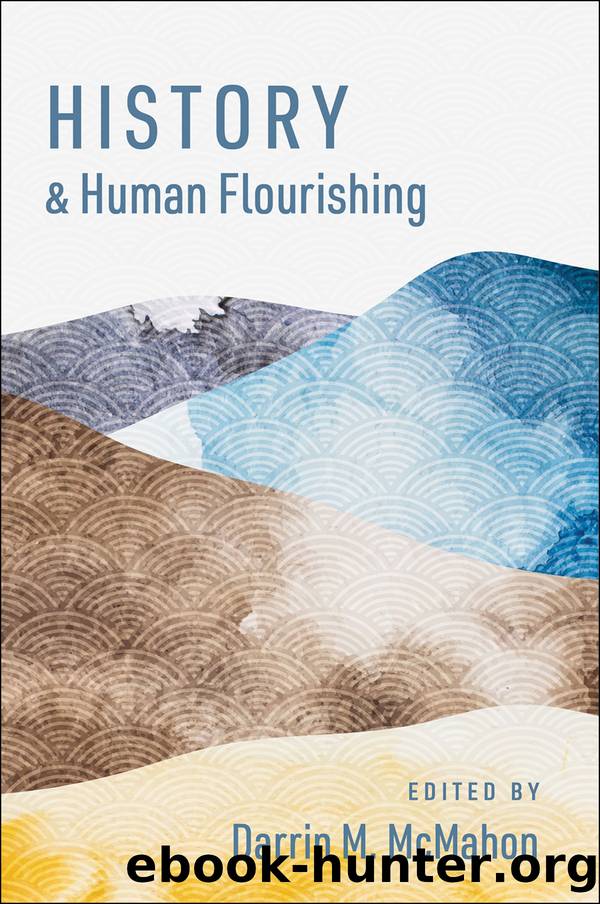History and Human Flourishing by Darrin M. McMahon

Author:Darrin M. McMahon
Language: eng
Format: epub, pdf
Publisher: Oxford University Press
Published: 2022-06-15T00:00:00+00:00
* * *
1 There is another intriguing historical issue here that has received some attention but should blossom further with the historyâwell-being connection: How long do measurable improvements in the human condition prompt a sense of well-being? We know that happiness improves when a group or region first advances. The question of why the huge reduction in child mortality has not inspired more lasting family satisfaction has been tackled at least obliquely: parents proved quickly capable of turning to other problems, and of course the very reduction in average mortality made any threat to childrenâs safety or physical health more ominous. But the overall topicâthe ability or inability to retain active appreciation for past progressâdeserves wider and more explicit analysis.
2 Terminology may also be more than trivial. Historians tend not to like cheerful neologisms such as âpositivityâ that loom large in the well-being literature. It turns out that while positivity was indeed an uncommon term until the 1950s, when it began a rapid ascent linked initially to boosters like Norman Vincent Peale and then further supported by the shifts in formal psychology, the term has an older ancestry, dating back to 1659. So perhaps we can adjust.
3 A new project in Finland, dubbed the History of Experiences, touches base with the kind of comprehensive agenda that can attach historical research to a better understanding of well-being.
4 Karen Lystra is about to release significant findings on the working-class experience of love and courtship in the later nineteenth century.
5 The history of the birthday is an intriguing opportunity to connect history and well-being: the idea of celebrating birthdays of ordinary people, including children, is a modern one, intimately connected to new ideas of happiness and joy. But as we will note later, the later evolution of birthdays complicates the relationship to well-beingâas early as the 1940s some parents were comparing the obligatory birthday party to mob rule.
6 The cautionary phrase, curiosity kills the cat, thus dates from the sixteenth century.
7 It is remarkable and revealing that, in an otherwise challenging work, Steven Pinkerâs recent effort ignores the family almost entirely. A more nuanced history can suggest a corrective that also adds useful complexity to the well-being movement.
8 Noralee Frankel kindly provided the material in this section. Also, any full examination of gratitude trajectories must also take fuller account of religious factors, most obviously in continuing to encourage gratitude toward God.
9 These wider considerations also connect to the larger project suggested by Darrin McMahon: the idea of an ambitious history of industrial happiness. Such a history can legitimately stress gains around living standards, health and longevity, education. But it must also come to grips with the failure of industrial society as yet to correct the kinds of inequalities that agricultural systems had introduced (though it redefines their nature) or definitively to reduce the prospect of war; and the implications of environmental change for human happiness must also be introduced into the mix.
Download
History and Human Flourishing by Darrin M. McMahon.pdf
This site does not store any files on its server. We only index and link to content provided by other sites. Please contact the content providers to delete copyright contents if any and email us, we'll remove relevant links or contents immediately.
The remains of the day by Kazuo Ishiguro(8999)
Tools of Titans by Timothy Ferriss(8396)
Giovanni's Room by James Baldwin(7346)
The Black Swan by Nassim Nicholas Taleb(7129)
Inner Engineering: A Yogi's Guide to Joy by Sadhguru(6796)
The Way of Zen by Alan W. Watts(6614)
The Power of Now: A Guide to Spiritual Enlightenment by Eckhart Tolle(5782)
Asking the Right Questions: A Guide to Critical Thinking by M. Neil Browne & Stuart M. Keeley(5775)
The Six Wives Of Henry VIII (WOMEN IN HISTORY) by Fraser Antonia(5515)
Astrophysics for People in a Hurry by Neil DeGrasse Tyson(5190)
Housekeeping by Marilynne Robinson(4448)
12 Rules for Life by Jordan B. Peterson(4305)
Ikigai by Héctor García & Francesc Miralles(4274)
Double Down (Diary of a Wimpy Kid Book 11) by Jeff Kinney(4272)
The Ethical Slut by Janet W. Hardy(4253)
Skin in the Game by Nassim Nicholas Taleb(4250)
The Art of Happiness by The Dalai Lama(4130)
Skin in the Game: Hidden Asymmetries in Daily Life by Nassim Nicholas Taleb(4007)
Walking by Henry David Thoreau(3962)
